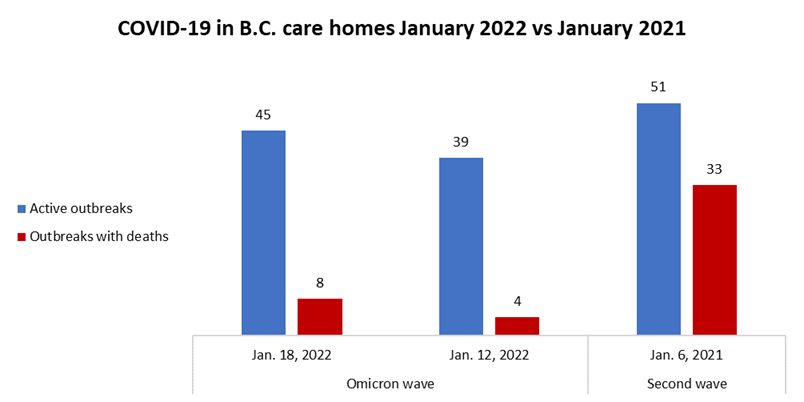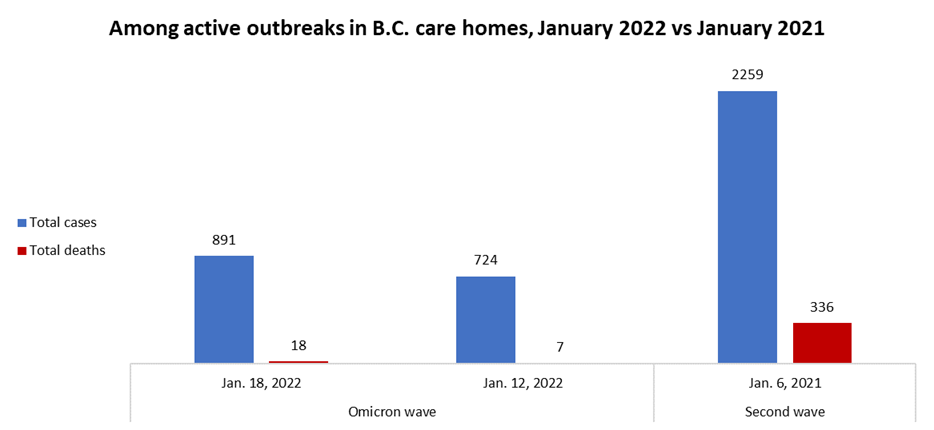Deaths associated with COVID-19 outbreaks in B.C. rising, but still far fewer than previous waves
The number of COVID-19 cases and outbreaks in B.C. care homes continues to grow during the Omicron surge, but deaths in this wave remain less common than they were during previous ones.
In the latest report on outbreaks in long-term care, assisted-living and independent-living homes from the B.C. Centre for Disease Control - which captures data as of Tuesday morning - there were 45 active outbreaks in the province.
Of those outbreaks, eight had any deaths associated with them (18 per cent of the total).
That's an increase from the previous week's report, when there were 39 active outbreaks and only four of them had resulted in deaths (10 per cent of the total number of outbreaks).
However, this week's numbers are still a far cry from what they were in January 2021, when the BCCDC reported 51 active outbreaks and 33 with deaths associated (65 per cent).
A similar pattern holds when looking at the percentage of care home cases ending in death. This week's 45 outbreaks have a total of 891 cases associated with them, and the eight that have seen at least one resident die have seen a total of 18 deaths between them.
This means that, so far, 2 per cent of infections associated with active care home outbreaks in B.C. have resulted in death.
That's an increase from last week, when a total of seven deaths were associated with 724 cases, good for a death rate of just 1 per cent.
It's still much improved from January 2021, however, when there were 2,259 infections associated with active outbreaks, and 336 people had died, a death rate of nearly 15 per cent.
 The number of active care home outbreaks in which residents have died for three specific dates, two from the Omicron wave and one from the second wave in January 2021. (Data from the BCCDC)
The number of active care home outbreaks in which residents have died for three specific dates, two from the Omicron wave and one from the second wave in January 2021. (Data from the BCCDC) Total cases and deaths associated with active outbreaks in B.C. care homes for three specific dates, two during the Omicron wave and one during the second wave in January 2021. (Data from the BCCDC)
Total cases and deaths associated with active outbreaks in B.C. care homes for three specific dates, two during the Omicron wave and one during the second wave in January 2021. (Data from the BCCDC)
Obviously, a lot has changed over the last year. In early 2021, the province was still in the process of administering first and second doses of COVID-19 vaccines in care homes. The Alpha variant of concern was just starting to appear in B.C. and had not yet become the dominant strain of the coronavirus in the province.
Today, the vast majority of care home residents have received booster doses of vaccine, and the extremely contagious Omicron variant is generally causing milder illness in those who have been immunized.
Speaking to reporters during a news conference Friday morning, provincial health officer Dr. Bonnie Henry credited high uptake of booster shots among residents and staff in long-term care with "changing the balance" of precautions that are needed in long-term care homes.
"With the increase in transmission in our communities, we've also seen increases in cases and outbreaks in long-term care and assisted living among both residents and staff," Henry said. "For family members, for people who work and operate in long-term care and for our public health team, I know this is very concerning."
"Our focus continues to be to protect our elders and seniors who we know - and we've seen the data - are more vulnerable to severe illness, but also to balance that with ensuring our seniors have the care and the support they need," she added.
Henry did not specify what changes would be made to long-term care restrictions as the province begins to manage COVID-19 more like it manages the common cold.
Unlike colds and flus, the coronavirus remains dangerous enough to warrant the public health measures B.C. currently has in place, the provincial health officer said.
Last month, Henry introduced a public health order restricting visits at long-term care homes to essential visitors only. That rule does not apply to assisted-living facilities.
CTVNews.ca Top Stories

Expert warns of food consumption habits amid rising prices
A new survey by Dalhousie University's Agri-Food Analytics Lab asked Canadians about their food consumption habits amid rising prices.
opinion The special relationship between King Charles and the Princess of Wales
Royal commentator Afua Hagan writes that when King Charles recently admitted Catherine to the Order of the Companions of Honour, it not only made history, but it reinforced the strong bond between the King and his beloved daughter-in-law.
Dozens of U.S. deaths reveal risks of injecting sedatives into people restrained by police
The practice of giving sedatives to people detained by police has spread quietly across the U.S. over the last 15 years, built on questionable science and backed by police-aligned experts, an investigation led by The Associated Press has found.
Charlie Woods, son of Tiger, shoots 81 in U.S. Open qualifier
Charlie Woods failed to advance in a U.S. Open local qualifying event Thursday, shooting a 9-over 81 at Legacy Golf & Tennis Club.
Improve balance and build core strength with this exercise
When it comes to cardiovascular fitness, you may tend to focus on activities that move you forward, such as walking, running and cycling.
B.C. tenants evicted for landlord's use after refusing large rent increase to take over neighbouring suite
Ashley Dickey and her mother rented part of the same Coquitlam duplex in three different decades under three different landlords.
Mountain guide dies after falling into a crevasse in Banff National Park
A man who fell into a crevasse while leading a backcountry ski group deep in the Canadian Rockies has died.
MPP Sarah Jama asked to leave Ontario legislature for wearing keffiyeh
MPP Sarah Jama was asked to leave the Legislative Assembly of Ontario by House Speaker Ted Arnott on Thursday for wearing a keffiyeh, a garment which has been banned at Queen’s Park.
Here's why provinces aren't following Saskatchewan's lead on the carbon tax home heating fight
After Prime Minister Justin Trudeau said the federal government would still send Canada Carbon Rebate cheques to Saskatchewan residents, despite Saskatchewan Premier Scott Moe's decision to stop collecting the carbon tax on natural gas or home heating, questions were raised about whether other provinces would follow suit. CTV News reached out across the country and here's what we found out.

































